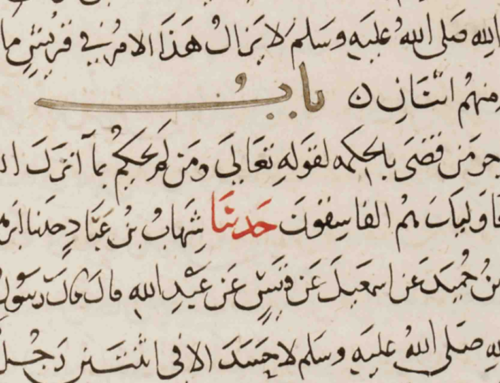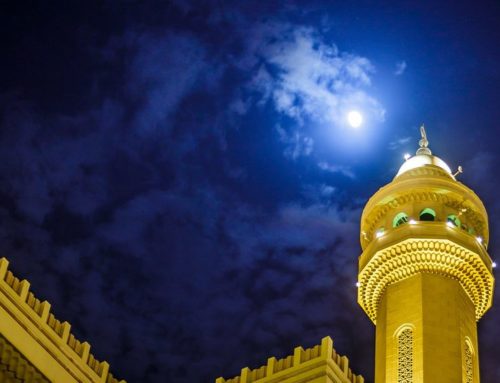Translated by Zameelur Rahman
Abu Bakr ibn Abi Shaybah and Zuhayr ibn Harb narrated to us: both from Ibn ‘Ulayyah. Zuhayr said: Isma’il ibn Ibrahim (Ibn ‘Ulayyah) narrated to us: from Abu Hayyan: from Abu Zur’ah ibn ‘Amr ibn Jarir from Abu Hurayrah that he said:
“One day the Messenger of Allah (Allah bless him and grant him peace) appeared before the people and a man came to him and said: ‘O Messenger of Allah, what is iman (true faith)? He replied: That you believe in Allah, His angels, His Books, His meeting, His Messengers and that you believe in the Resurrection hereafter.’
“He said: ‘O Messenger of Allah, what is islam (submission). He replied: islam is that you worship Allah and do not associate anything with Him, you establish the prescribed salah, you pay the obligatory zakah and you fast during Ramadan.’
“He said: ‘O Messenger of Allah, what is ihsan (excellence)? He replied: That you worship Allah as if you see Him, and if you see Him not that He sees you.’
“He said: ‘O Messenger of Allah, when is the Hour?’ He replied: ‘The one who is asked about it knows no better than the inquirer. I will, however, narrate to you some of its portents: when the slave-girl will give birth to her master, this is one of its portents; when the naked, barefooted would become the chiefs of people, this is one of its portents; when the shepherds of black camels would compete in high-rise buildings, this is one of its portents.
“‘The knowledge of the Hour is among the five which none knows but Allah.’ Then he (Allah bless him and grant him peace) recited: ‘Verily the knowledge of the Hour is with Allah alone. It is He Who sends down rain, and He Who knows what is in the wombs. Nor does anyone know what it is that he will earn on the morrow: Nor does anyone know in what land he is to die. Verily with Allah is full knowledge and He is acquainted with all things.'” (31:34)
Abu Hurayrah (Allah be pleased with him) said: “Then the person turned back and the Messenger of Allah (Allah bless him and grant him peace) said: ‘Bring that man back to me.’ They went to bring him back, but they saw nothing. Upon this the Messenger of Allah (Allah bless him and grant him peace) remarked: ‘this was Jibril, he came to teach the people their religion.'” (Sahih Muslim)
His statement “among the five which none knows but Allah”: the knowledge of the time of the hour is from the five which none knows but Allah.
Al-Qurtubi said: “No one can expect to know one of these five matters because of this hadith. The Prophet (Allah bless him and grant him peace) explained the statement of Allah Most High: “With Him are the keys of the ghayb (unseen), that none knoweth but He” (6:59) as these five. And this [hadith] is from the authentic [narrations].” Al-Qutubi said: “So whoever claims knowledge of one of these without a chain back to Allah’s Messenger (Allah bless him and grant him peace), he is a liar in his claim.” He said: “As for conjecture about the ghayb this is possible for the astrologer and other than him when it is [extrapolated] from a general law, and this is not knowledge. Ibn ‘Abd al-Barr transmitted ijma’ (consensus) on the prohibition of accepting fees and wages and offering it for such speculative knowledge. It has been transmitted from Ibn Mas’ud (Allah be pleased with him) that he said: ‘Your Prophet (Allah bless him and grant him peace) was granted knowledge of all things besides these five.’ The like of it [was narrated] from Ibn ‘Umar (Allah be pleased with them both) in marfu’ form. Ahmad transmitted both of them. Humayd ibn Zanjawayh transmitted from one of the Companions that he mentioned the knowledge of the time of the eclipse before its occurrence, and the Prophet repudiated him saying, ‘Verily the ghayb is five’ and he recited the verse [31:34], ‘and what is unseen besides these, are known to some and unknown to some.'”
‘Ali al-Qari said: “If you ask: the Prophets and the Saints (Awliya) have indeed given much information on these five, so wherefore the restriction? I reply: the restriction is by consideration of their universals, not their particulars. He Most High said ‘He revealeth unto none His ghayb, except a messenger whom He has chosen’ (72:26-7), on the basis of the istithna (exception) being muttasil (connected) [1]In a muttasil exception, the exception is from the same category as that from which it is excluded. In this case, therefore, the knowledge that is disclosed is from the same category of ghayb, if the … Continue reading as is the norm. Furthermore, what some of the Saints mentioned by way of karamah (miracle) in giving information of some of the particulars from the content of the universals of the verse, it is possible by way of mukashafa (unveiling), ilham (inspiration) or manam (dream), which are probabilistic (zanniyyat), and are not designated as certain knowledge.”
And he said in another place: “Indeed ghayb consists of cores (mabadi’) and appendages (lawahiq). The cores are not disclosed to an angel brought nigh (malak muqarrab) or a Prophet that is sent (nabi mursal). As for the appendages, they are what Allah reveals to some of His beloveds from the tablet of His knowledge, and this is then excluded from absolute ghayb (al-ghayb al-mutlaq), and becomes relative ghayb (ghayb idafi). This [disclosure occurs] when the pure spirit is illuminated, and its light and illumination increases by turning away from the shadows of the world of senses, clearing the mirror of the heart from natural rust, persevering in [acquiring] knowledge and [performing] good works, and effusion of divine lights, until the light strengthens and expands in the accomplishment of one’s heart; then the inscriptions written in the Preserved Tablet are reflected onto it, and it is shown the divine secrets (mughayyabat), and is given free-disposal in the lower world of bodies. Rather, thereupon the purest effusion becomes manifest by true gnosis of Him which is the most glorious of bestowals, so what of [bestowals] besides this?”
The weak servant (Allah pardon him) says:
Since areas [of study] consist of principles (usul) and peripherals (furu’), actual knowledge of them is restricted to knowledge of their principles. As for knowledge of the peripherals without knowledge of the principles, it is not regarded as knowledge by the scholars and experts [of the field], and it is only knowledge in its linguistic sense according to the general public who are limited [in their expertise]. An example of this is when one of the people memorises thousands of particular juristic rulings like the wajibs (the compulsory), the harams (the unlawful), the mandubs (the recommended) and the makruhs (the disliked), he is not called according to them an ‘alim (scholar) or a faqih (jurist), until he knows its principles and its universals. On the other hand, one who knows the principles of the rulings and their sources is an ‘alim and a faqih according to them, even if recalling some of the particulars and peripherals escapes him, for indeed the principles and the universals are the keys to the peripherals and the particulars, and not the other way round.
This is how it should be understood in this context that the unqualified application of [the designation] ‘alim al-ghayb is not suitable except for one who knows the principles of ghayb and its universals. As regards to cognizance (ittila’) of some of the divine secrets (mughayyabat), even if it is extensive, it is not called knowledge (‘ilm), nor is one who acquires them an ‘alim, except as a kind of vagueness [in expression], until one knows their principles and foundations, and these principles and universals are the keys of the ghayb which are with Allah Most High. None knows them but He.
Hence, the knowledge of these five matters mentioned in the hadith of the chapter, is specific to Allah (Glorified and Exalted is He), whereby none from the creation can expect to acquire their principles and their universals, in the same way one of them acquires the time of the eclipse of the sun or the moon by [recourse to] the mathematical laws of nature, for example, and he reports it before it occurs by specifying its precise time in distant lands. For such, the likes of it are not regarded as knowledge of the ghayb according to the ‘ulama, since it is acquired by the erection of evidences that point to it.
Yes, disclosure of some of His (Most High) knowledge and revealing some of His secrets (ghuyub) is possible and has occurred with regard to some of the servants, but this is by way of a partial presentation (al-‘ard al-juz’i) only, and it is not encompassment of the principles of ghayb and universal knowledge at all. If this partial disclosure occurred to [an individual] other than the Prophets (upon them prayers and peace) one cannot be certain about his integrity, safety and protection from the machinations of Satan, delusions of the self, etc. When it occurred to the Prophets (Allah’s Prayers and His peace on them), its integrity, and safety from the interference of Satan, confusions of the self and all that removes its authority, is certain.
Thus, Allah (Glorified and Exalted is He) does not reveal, i.e. does not empower, any with His ghayb whereby the possibility of error or delusion effectively does not come into contact with it, except one He has chosen as a Messenger [i.e. according to Qur’an 72:26-7]. Hence, He empowers the Messenger with whatever He wills from His ghayb, and He has not left any from among men and jinn that are able to corrupt him or prevent the establishment of his signs, “… for indeed a band of watchers (from the angels) march before him and behind him, that He may know that they have (truly) brought and delivered the Messages of their Lord: and He surrounds all that are with them, and takes account of every single thing” (Qur’an 72:27-8).
From this account, the distinction between the revelation (wahy) of the Prophets and the unveilings (kushuf) of the Saints becomes clear, [as does the fact] that the knowledge of the five matters mentioned in the hadith of the chapter is specific to Allah (Glorified and Exalted is He). This specificity does not necessitate by its mention the negation of the specificity of other knowledge besides these, for indeed it is possible that the specification recited [in the verse] is for [general] benefit, or due to the particular circumstance in the revelation of the verse. And Allah (Glorified and Exalted is He) knows best what is right.
(Fath al-Mulhim vol. 1 pp. 462-3)
| ↑1 | In a muttasil exception, the exception is from the same category as that from which it is excluded. In this case, therefore, the knowledge that is disclosed is from the same category of ghayb, if the exception is believed to be muttasil |
|---|







Assalam o ‘alaykum,
Knowledge of the Five – The keys of the unseen
http://barelwism.wordpress.com/2012/04/19/knowledge-of-the-five-the-keys-of-the-unseen/